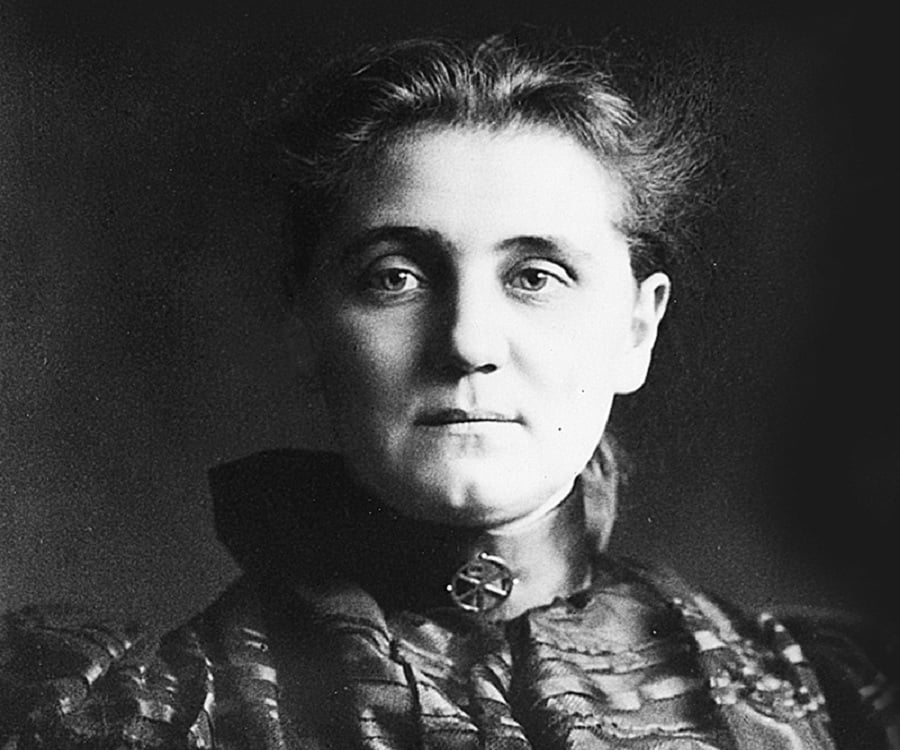Jane Addams: A Sense of Duty
Special to the Newsletter
By Michael F. Bishop
Jane Addams was one of the most famous American women of the early twentieth century, a pioneering sociologist and activist who devoted her life and career to addressing the ills of modern life.

She was born Laura James Addams in Illinois in 1860, two months before the election of Abraham Lincoln as president of the United States. Her politician father had been a longtime ally of Lincoln and she treasured the connection. And like her fellow Illinoisan, she was destined to make her mark on the world.
Addams was driven from an early age to help the less fortunate; as a young woman and exceptionally gifted student, she yearned to become a physician and heal the sick. But a youthful bout of tuberculosis left her unable to finish her medical studies. She turned her attention instead to the plight of the poor, using her considerable fortune to help found Hull House in Chicago, the most famous of many such “settlement houses” in the United States and the United Kingdom.
The settlement house movement was an idealistic crusade that sought to–unite under one roof–members of different social classes. In these houses, wealthy and middle-class people would live, study, and exercise with working class and poor members of the community. In an age when immigrants lived in separate, ethnically defined communities, settlement houses offered an opportunity for Germans, Italians, Jews, and others to interact in a congenial environment. Addams believed that bringing people of various backgrounds together would allow them to learn from each other and develop a broader sense of community.
Addams became an important public spokeswoman for progressivism, an ideology that championed social reform through government regulation, scientific advancement, and improved educational opportunities. She believed that “Social advance depends quite as much upon an increase in moral sensibility as it does upon a sense of duty”, and saw it as the duty of privileged to rescue the poor from dangerous and unhealthy habits. In 1912, she co-founded the Progressive Party, and despite her opposition to imperialism, nominated the often-bellicose former President Theodore Roosevelt as its first presidential candidate. She and Roosevelt would react very differently to the European conflagration of two years later; he strongly advocated American involvement in the war, while she opposed it. Indeed, pacifism would become one of her most passionately held ideals. She blanched at what she saw as the harsh terms exacted upon Germany in the Treaty of Versailles, accurately foreseeing that they would lead to further conflict.
For all her humanitarian zeal, Addams had a vast blind spot. Like many progressives of the era, Addams was a keen supporter of eugenics. Her determination to reorder and improve society led her to support the elimination of certain undesirable characteristics. In prose that now seems chilling, she observed, “When this new science makes clear to the public that those diseases which are a direct outcome of the social evil are clearly responsible for race deterioration, effective indignation may at last be aroused, both against preventable infant mortality for which these diseases are responsible, and against the ghastly fact that the survivors among these afflicted children infect their contemporaries and hand on the evil heritage to another generation.”
Addams never married but had romantic relationships with women, including one with a fellow activist that lasted decades and brought her great comfort. Her views of men could perhaps be summed up in her wry observation, “I am not one of those who believe – broadly speaking – that women are better than men. We have not wrecked railroads, nor corrupted legislatures, nor done many unholy things that men have done; but then we must remember that we have not had the chance.”
Her greatest love was her work, which took her around the country and overseas to deliver lectures and spread her gospel of peace and justice. And she received the ultimate accolade in 1931, when she became only the second woman to win the Nobel Peace Prize. The Nobel committee lauded her and her fellow winner, Nicholas Murray Butler, “for their assiduous effort to revive the ideal of peace and to rekindle the spirit of peace in their own nation and in the whole of mankind.”
She died in her beloved Illinois four years later, at the age of 74, still confident in her belief that “The good we secure for ourselves is precarious and uncertain until it is secured for all of us and incorporated into our common life.”
Michael F. Bishop, a writer and historian, is the former executive director of the International Churchill Society and the Abraham Lincoln Bicentennial Commission. He is the author of “We Shall Fight: Churchill’s Greatest Speech,” to be published by HarperCollins.




